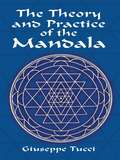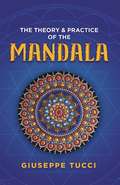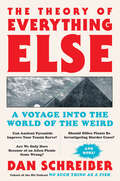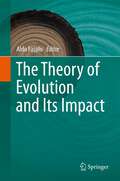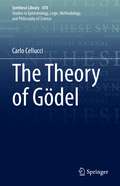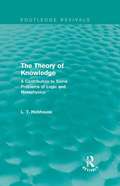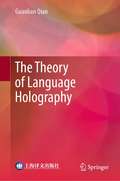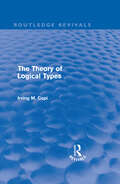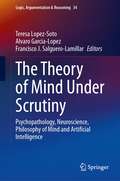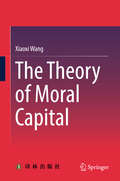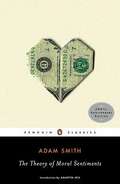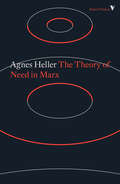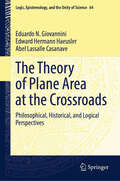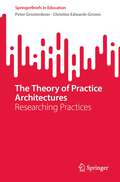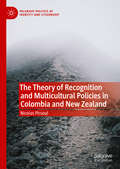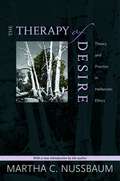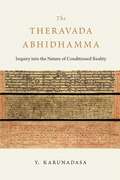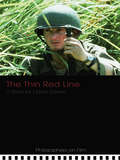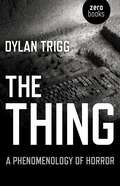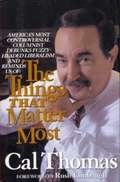- Table View
- List View
The Theory and Practice of the Mandala
by Giuseppe TucciExamines theory and practice of the mandala and how it's used to express the infinite possibilities of the human subconscious. Individual chapters consider the doctrinal basis of the mandala, the mandala as a means of reintegration, the symbolism of the mandala and its various parts, the liturgy of the mandala, and more.
The Theory and Practice of the Mandala
by Giuseppe TucciMandalas are complex arrangements of patterns or pictures used in Hindu and Buddhist Tantrism to represent the cosmos and to give expression to the infinite possibilities of the human subconscious. Believers rely upon this powerful figure as a focus of ritual and a support for meditations, using it to gain possession of the energies signified by its images or symbols. This intriguing, thought-provoking study by one of the world's leading authorities on the subject examines the basic doctrine behind the theory and practice of the mandala in India and Tibet, by both Hindus and Buddhists. Individual chapters consider the doctrinal basis of the mandala, its various parts, liturgy, and relationship to the human body. Of special interest to students of Eastern philosophy and art, this study will also fascinate New Agers and anyone interested in the symbols and psychology of Asian cultures.
The Theory of Descriptions
by Graham StevensThe book combines a historical and philosophical study of Russell's theory of descriptions. It defends, develops and extends the theory as a contribution to natural language semantics while also arguing for a reassessment of the important of linguistic inquiry to Russell's philosophical project.
The Theory of Everything Else: A Voyage Into the World of the Weird
by Dan Schreiber"Absorbing. ... As thoughtfully written as it is nuts." —Chicago TribuneA collection of the world’s most mind-boggling, thought-provoking, and downright hilarious theories by the co-host of the hit podcast No Such Thing as a Fish, Dan Schreiber.Why are we here? Do ghosts exist? Will we ever travel back in time? Are we being visited by extraterrestrials? Will we ever talk to animals? Are we being told the truth? Are mysterious creatures roaming the Earth? And why, when you’re in the shower, does the shower curtain always billow in towards you?We don’t know the answers to any of these questions (that includes the shower-curtain one, which is a mystery that has eluded scientists for decades, and which they are still trying to solve). But don’t worry, no matter what questions you have, you can bet on the fact that there is someone (or something) out there, investigating it on your behalf—and Dan Schreiber collects their latest findings.From the Silicon Valley tech billionaires currently trying to work out whether or not the universe is one giant video game simulation to the self-proclaimed community of Italian time-travelers who are trying to save the world from destruction; The Theory of Everything Else will act as a handbook for those who want to think differently.
The Theory of Evolution and Its Impact
by Aldo FasoloYear 2009 was the triumph of Darwin as a global superstar, spinning from the pop icon to the actual understanding to what make him a great innovator, able to give a turn to whole modern culture. Does all this activity mean evolution has lost its ability to excite fear and opposition? After such a deluge of books, conferences, reviews, gadgets, what is today our vision on theory of Evolution and its Impact? These are the questions asked at an inter-academy conference held in Torino (May 27-29, 2010) among the Accademia delle Scienze di Torino, the Accademia Nazionale dei Lincei and the Berlin-Brandenburgische Akademie der Wissenschaften. The present book collects the contributions from the meeting, mixing styles, arguments, topics, history and philosophy of science, modern biology and epistemology . This kind of inter-disciplinary approach may appear erratic, but it conveys flashes of lights on the changing scene where the theory of evolution plays. This is in line with the idea to reopen the file of the Two Cultures, looking at shared problems, which are not yet really the Third Culture invoked by Charles Percy Snow half a century ago, but they can foster it, at least in such a pivotal domain as evolution. According to the philosopher Michael Ruse, the conclusion is "that in fifty years or a hundred years we will still have the theory of the Origin around. Great, precisely because it does not stand still, but remakes itself and grows and changes by virtue of the fact that it gives such a terrific foundation. Is Darwinism past its sell-by date? Not by a long chalk yet!"
The Theory of Evolution: Principles, Concepts, and Assumptions
by Samuel M. Scheiner David P. MindellDarwin’s nineteenth-century writings laid the foundations for modern studies of evolution, and theoretical developments in the mid-twentieth century fostered the Modern Synthesis. Since that time, a great deal of new biological knowledge has been generated, including details of the genetic code, lateral gene transfer, and developmental constraints. Our improved understanding of these and many other phenomena have been working their way into evolutionary theory, changing it and improving its correspondence with evolution in nature. And while the study of evolution is thriving both as a basic science to understand the world and in its applications in agriculture, medicine, and public health, the broad scope of evolution—operating across genes, whole organisms, clades, and ecosystems—presents a significant challenge for researchers seeking to integrate abundant new data and content into a general theory of evolution. This book gives us that framework and synthesis for the twenty-first century. The Theory of Evolution presents a series of chapters by experts seeking this integration by addressing the current state of affairs across numerous fields within evolutionary biology, ranging from biogeography to multilevel selection, speciation, and macroevolutionary theory. By presenting current syntheses of evolution’s theoretical foundations and their growth in light of new datasets and analyses, this collection will enhance future research and understanding.
The Theory of Evolution: Principles, Concepts, and Assumptions
by Samuel M. Scheiner David P. MindellDarwin’s nineteenth-century writings laid the foundations for modern studies of evolution, and theoretical developments in the mid-twentieth century fostered the Modern Synthesis. Since that time, a great deal of new biological knowledge has been generated, including details of the genetic code, lateral gene transfer, and developmental constraints. Our improved understanding of these and many other phenomena have been working their way into evolutionary theory, changing it and improving its correspondence with evolution in nature. And while the study of evolution is thriving both as a basic science to understand the world and in its applications in agriculture, medicine, and public health, the broad scope of evolution—operating across genes, whole organisms, clades, and ecosystems—presents a significant challenge for researchers seeking to integrate abundant new data and content into a general theory of evolution. This book gives us that framework and synthesis for the twenty-first century. The Theory of Evolution presents a series of chapters by experts seeking this integration by addressing the current state of affairs across numerous fields within evolutionary biology, ranging from biogeography to multilevel selection, speciation, and macroevolutionary theory. By presenting current syntheses of evolution’s theoretical foundations and their growth in light of new datasets and analyses, this collection will enhance future research and understanding.
The Theory of Evolution: Principles, Concepts, and Assumptions
by Samuel M. Scheiner David P. MindellDarwin’s nineteenth-century writings laid the foundations for modern studies of evolution, and theoretical developments in the mid-twentieth century fostered the Modern Synthesis. Since that time, a great deal of new biological knowledge has been generated, including details of the genetic code, lateral gene transfer, and developmental constraints. Our improved understanding of these and many other phenomena have been working their way into evolutionary theory, changing it and improving its correspondence with evolution in nature. And while the study of evolution is thriving both as a basic science to understand the world and in its applications in agriculture, medicine, and public health, the broad scope of evolution—operating across genes, whole organisms, clades, and ecosystems—presents a significant challenge for researchers seeking to integrate abundant new data and content into a general theory of evolution. This book gives us that framework and synthesis for the twenty-first century. The Theory of Evolution presents a series of chapters by experts seeking this integration by addressing the current state of affairs across numerous fields within evolutionary biology, ranging from biogeography to multilevel selection, speciation, and macroevolutionary theory. By presenting current syntheses of evolution’s theoretical foundations and their growth in light of new datasets and analyses, this collection will enhance future research and understanding.
The Theory of Gödel (Synthese Library #470)
by Carlo CellucciThis book presents Gödel’s incompleteness theorems and the other limitative results which are most significant for the philosophy of mathematics. Results are stated in the form most relevant for use in the philosophy of mathematics. An appendix considers their implications for Hilbert’s Program for the foundations of mathematics. The text is self-contained, all notions being explained in full detail, but of course previous exposure to the very first rudiments of mathematical logic will help.
The Theory of Knowledge: A Contribution to Some Problems of Logic and Metaphysics (Routledge Revivals)
by L. T. HobhouseL. T. Hobhouse (1864-1929) was fundamental to the New Liberal movement of the late nineteenth and early twentieth century. He authored many important works in the fields of philosophy, economics and social liberalism. First published in 1896, The Theory of Knowledge considers the content and validity of knowledge, and the conditions on which our understanding of knowledge is based. It is a rich and important classic, which remains of value to students and academics with an interest in sociology, anthropology and the philosophy of logic.
The Theory of Language Holography
by Guanlian QianThis book presents a method of linking the ordered structure of the cosmos with human thoughts: the theory of language holography. In the view presented here, the cosmos is in harmony with the human body and language, and human thoughts are holographic with the cosmos at the level of language. In a word, the holographic relation is nothing more than the bridge by means of which Guanlian Qian connects the cosmos, human, and language. This is a vitally important contribution to linguistic and philosophical studies that cannot be ignored.The book has two main focus areas: outer language holography and inner language holography. These two areas constitute the core of the dynamic and holistic view put forward in the theory of language holography. The book’s main properties can be summarized into the following points: First and foremost, it is a book created in toto by a Chinese scholar devoted to pragmatics, theoretical linguistics, and philosophy of language. Secondly, the book was accepted by a top Chinese publisher and was republished the second year, which reflected its value and appeal. Thirdly, in terms of writing style, the book is characterized by succinctness and logic. As a result, it reads fluidly and smoothly without redundancies, which is not that common in linguistic or even philosophical works. Lastly, as stated by the author in the introduction, “Creation is the development of previous capacities, but it is also the generation of new ones”; this book can be said to put this concept into practice. Overall, the book offers a unique resource to readers around the world who want to know more about the truly original and innovative studies of language in Chinese academia.
The Theory of Logical Types: Monographs In Modern Logic (Routledge Revivals)
by Irving M. CopiThis reissue, first published in 1971, provides a brief historical account of the Theory of Logical Types; and describes the problems that gave rise to it, its various different formulations (Simple and Ramified), the difficulties connected with each, and the criticisms that have been directed against it. Professor Copi seeks to make the subject accessible to the non-specialist and yet provide a sufficiently rigorous exposition for the serious student to see exactly what the theory is and how it works.
The Theory of Mind Under Scrutiny: Psychopathology, Neuroscience, Philosophy of Mind and Artificial Intelligence (Logic, Argumentation & Reasoning #34)
by Teresa Lopez-Soto Francisco J. Salguero-Lamillar Alvaro Garcia-LopezThis book is a call to expand and diversify our approach to the study of the human mind in relation to the Theory of Mind. It proposes that it is necessary to combine cross-disciplinary methods to arrive at a more complete understanding of how our minds work. Seeking to expand the discussion surrounding the Theory of Mind beyond the field of psychology, and its focus on our capacity to ascribe mental states to other people, this volume collects evidence and research to point to a more holistic understanding of our own minds, the minds of others, behavior, language, and reasoning. This book therefore illuminates the conceptual intricacy underlying the Theory of Mind. It posits that a wide scope is necessary to make a breakthrough in scientific research towards a full understanding of the nature, function, and development of our capacity to converge on biological processes of the brain towards consciousness, emotion, awareness, and cognition. The volume presents methods, results, critiques, and models intended to provoke debates in various academic disciplines. It is of interest to scholars working in psychology, neuroscience, philosophy of mind, and artificial intelligence.
The Theory of Moral Capital
by Xiaoxi WangThis book captures the quintessence of the author’s 20-year career, presenting both unique perspectives and logical arguments. Guided by the Marxist concept of historical materialism, it reveals the function and effect of morality by analyzing and defining the moral domain. Further, it argues that economic development requires moral support by analyzing the inseparable logical connection between economics and morality. Moreover, it investigates moral capital and its route to achieving value multiplication in economic activities, and proposes a practice and evaluation index system for moral capital in enterprises. Combining philosophical analysis and the exploration of practical applications, the book also discusses a basic strategy to help enterprises enrich and manage their moral capital.
The Theory of Moral Sentiments: Or, An Essay Towards An Analysis Of The Principles By Which Men Naturally Judge Concerning The Conduct And Character, First Of Their Neighbours, And Afterwards Of Themselves; To Which Is Added A Dissertation On The Origin O
by Adam SmithThe foundation for a general system of morals, this 1749 work is a landmark in the history of moral and political thought. Readers familiar with Adam Smith from The Wealth of Nations will find this earlier book a revelation. Although the author is often misrepresented as a calculating rationalist who advises the pursuit of self-interest in the marketplace, regardless of the human cost, he was also interested in the human capacity for benevolence — as The Theory of Moral Sentiments amply demonstrates. The greatest prudence, Smith suggests, may lie in following economic self-interest in order to secure the basic necessities. This is only the first step, however, toward the much higher goal of achieving a morally virtuous life. Smith elaborates upon a theory of the imagination inspired by the philosophy of David Hume. His reasoning takes Hume's logic a step further by proposing a more sophisticated notion of sympathy, leading to a series of highly original theories involving conscience, moral judgment, and virtue. Smith's legacy consists of his reconstruction of the Enlightenment idea of a moral, or social, science that embraces both political economy and the theory of law and government. His articulate expression of his philosophy continues to inspire and challenge modern readers.
The Theory of Need in Marx (Radical Thinkers)
by Ken Coates Agnes Heller Stephen BodingtonThe first full presentation of a fundamental aspect of Marx, the concept of needWhat are needs? While the edifices of economic theory are built upon various mechanisms designed to satisfy “human needs,” not many economists have addressed the idea of need itself. Heller’s highly original work identifies this lacuna, recognizing the concept of needs as playing a “hidden but principal role in Marx’s economic categories.” Her writing lucidly exposes radical needs as bearing the seeds of revolutionary agency in alienated capitalist society, and reasserts our existence as sentient beings beyond the realm of the material, productive spheres.
The Theory of Plane Area at the Crossroads: Philosophical, Historical, and Logical Perspectives (Logic, Epistemology, and the Unity of Science #64)
by Edward Hermann Haeusler Eduardo N. Giovannini Abel Lassalle CasanaveThis book explores a cluster of philosophical, historical, and logical problems concerning the foundations of the theory of plane area in elementary geometry. The motivation of this study is a notable geometrical proposition known as De Zolt’s postulate, which asserts that a polygon cannot be equal in area to a proper polygonal part. The book is the first systematic investigation of the philosophical and foundational significance of this proposition, which can also be described as the “fundamental theorem” of the theory of plane area. This volume provides a comparative study of Euclid’s development of the theory of area in the Elements and its modern reinterpretation in Hilbert’s classical monograph Foundations of Geometry. It connects the historical reflections on De Zolt’s postulate with the nineteenth-century program of providing a purely geometrical foundation for Euclidean geometry, uncovering a rich array of intertwined conceptual problems. It also shifts the perspective and provides a logical analysis of this geometrical postulate within an original development of the abstract theory of magnitudes, called compatible magnitudes. Finally, it extends the previous formal treatment of De Zolt’s postulate to the case of three-dimensional geometry by producing a type system for polyhedral geometrical mereology. The innovative combination of philosophical, historical, and logical perspectives results in a novel discussion of a fascinating problem at the crossroads of (late) nineteenth-century geometry. This volume will interest readers in the fields of history and philosophy of mathematics, logic, and formal philosophy.
The Theory of Practice Architectures: Researching Practices (SpringerBriefs in Education)
by Peter Grootenboer Christine Edwards-GrovesThis book provides an overview of the Theory of Practice Architectures (TPA), and the associated Theory of Ecology of Practices, in a manner accessible for a broader audience. The authors are part of the authorial team that developed the Theory of Practice Architectures from a strong empirical base, with its initial publication in 'Changing Practices, Changing Education' (Kemmis et al., Springer, 2014). This book follows on from that publication with a singluar focus on the Theory of Practice Architectures, and shows how it can be used as a theoretical framework for a range of empirical research projects. It first outlines and describes both the Theory of Practice Architectures and the Theory of Ecology of Practices, illustrating them with a range of relevant practical examples. Then, it focuses explicitly on designing and undertaking empirical research, analyzing data and reporting findings using the Theory of Practice Architectures. In this way, this book shows specifically and overtly explicate ways that research can be designed, and how data can be collected and analyzed, drawing on the Theory of Practice Architectures as a foundational framework. It also showcases a range of specific examples to allow readers to see the ideas as they have been employed in practice.
The Theory of Recognition and Multicultural Policies in Colombia and New Zealand (Palgrave Politics of Identity and Citizenship Series)
by Nicolas PirsoulThis book analyses the policies of recognition that were developed and implemented to improve the autonomy and socio-economic well-being of Māori in New Zealand and of indigenous and Afro-descendent people in Colombia. It offers a theoretically informed explanation of the reasons why these policies have not yielded the expected results, and offers solutions to mitigate the shortcomings of policies of recognition in both countries. This in-depth analysis enables readers to develop their understanding of the theory of recognition and how it can promote social justice.
The Theory of the Sublime from Longinus to Kant
by Robert DoranIn this book, Robert Doran offers the first in-depth treatment of the major theories of the sublime, from the ancient Greek treatise On the Sublime (attributed to 'Longinus') and its reception in early modern literary theory to the philosophical accounts of Burke and Kant. Doran explains how and why the sublime became a key concept of modern thought and shows how the various theories of sublimity are united by a common structure - the paradoxical experience of being at once overwhelmed and exalted - and a common concern: the preservation of a notion of transcendence in the face of the secularization of modern culture. Combining intellectual history with literary theory and philosophical analysis, his book provides a new, searching and multilayered account of a concept that continues to stimulate thought about our responses to art, nature and human events.
The Therapy of Desire: Theory and Practice in Hellenistic Ethics (Princeton Classics #33)
by Martha C. NussbaumThe Epicureans, Skeptics, and Stoics practiced philosophy not as a detached intellectual discipline but as a worldly art of grappling with issues of daily and urgent human significance. In this classic work, Martha Nussbaum maintains that these Hellenistic schools have been unjustly neglected in recent philosophic accounts of what the classical "tradition" has to offer. By examining texts of philosophers such as Epicurus, Lucretius, and Seneca, she recovers a valuable source for current moral and political thought and encourages us to reconsider philosophical argument as a technique through which to improve lives. Written for general readers and specialists, The Therapy of Desire addresses compelling issues ranging from the psychology of human passion through rhetoric to the role of philosophy in public and private life.
The Theravada Abhidhamma: Inquiry into the Nature of Conditioned Reality
by Y. KarunadasaA lucid explanation of the basic contours of the Theravada Abhidamma system for serious students of Buddhist thought.The renowned Sri Lankan scholar Y. Karunadasa examines Abhidhamma perspectives on the nature of phenomenal existence. He begins with a discussion of dhamma theory, which describes the bare phenomena that form the world of experience. He then explains the Abhidhamma view that only dhammas are real, and that anything other than these basic phenomena are conceptual constructs. This, he argues, is Abhidhamma’s answer to common-sense realism—the mistaken view that the world as it appears to us is ultimately real. Among the other topics discussed are the theory of double truth (ultimate and conceptual truth), the analysis of mind, the theory of cognition, the analysis of matter, the nature of time and space, the theory of momentary being, and conditional relations. The volume concludes with an appendix that examines why the Theravada came to be known as Vibhajjavada, “the doctrine of analysis.” Not limiting himself to abstract analysis, Karunadasa draws out the Abhidhamma’s underlying premises and purposes. The Abhidhamma provides a detailed description of reality in order to identify the sources of suffering and their antidotes—and in doing so, to free oneself.
The Thin Red Line (Philosophers on Film)
by David DaviesThe Thin Red Line is the third feature-length film from acclaimed director Terrence Malick, set during the struggle between American and Japanese forces for Guadalcanal in the South Pacific during World War Two. It is a powerful, enigmatic and complex film that raises important philosophical questions, ranging from the existential and phenomenological to the artistic and technical. This is the first collection dedicated to exploring the philosophical aspects of Malick’s film. Opening with a helpful introduction that places the film in context, five essays, four of which were specially commissioned for this collection, go on to examine the following: the exploration of Heideggerian themes – such as being-towards-death and the vulnerability of Dasein’s world – in The Thin Red Line how Malick’s film explores and cinematically expresses the embodied nature of our experience of, and agency in, the world Malick’s use of cinematic techniques, and how the style of his images shapes our affective, emotional, and cognitive responses to the film the role that images of nature play in Malick’s cinema, and his ‘Nietzschean’ conception of human nature. The Thin Red Line is essential reading for students interested in philosophy and film or phenomenology and existentialism. It also provides an accessible and informative insight into philosophy for those in related disciplines such as film studies, literature and religion. Contributors: Simon Critchley, Hubert Dreyfus and Camilo Prince, David Davies, Amy Coplan, Iain Macdonald.
The Thing: A Phenomenology of Horror
by Dylan TriggWhat is the human body? Both the most familiar and unfamiliar of things, the body is the centre of experience but also the site of a prehistory anterior to any experience. Alien and uncanny, this other side of the body has all too often been overlooked by phenomenology. In confronting this oversight, Dylan Trigg&’s The Thing redefines phenomenology as a species of realism, which he terms unhuman phenomenology. Far from being the vehicle of a human voice, this unhuman phenomenology gives expression to the alien materiality at the limit of experience. By fusing the philosophies of Merleau-Ponty, Husserl, and Levinas with the horrors of John Carpenter, David Cronenberg, and H.P. Lovecraft, Trigg explores the ways in which an unhuman phenomenology positions the body out of time. At once a challenge to traditional notions of phenomenology, The Thing is also a timely rejoinder to contemporary philosophies of realism. The result is nothing less than a rebirth of phenomenology as redefined through the lens of horror.
The Things That Matter Most
by Cal ThomasIn this controversial and thought-provoking bestseller that has sold more than 125,000 copies, America's fastest-growing syndicated columnist explains how we have lost sight of the things that matter most.
